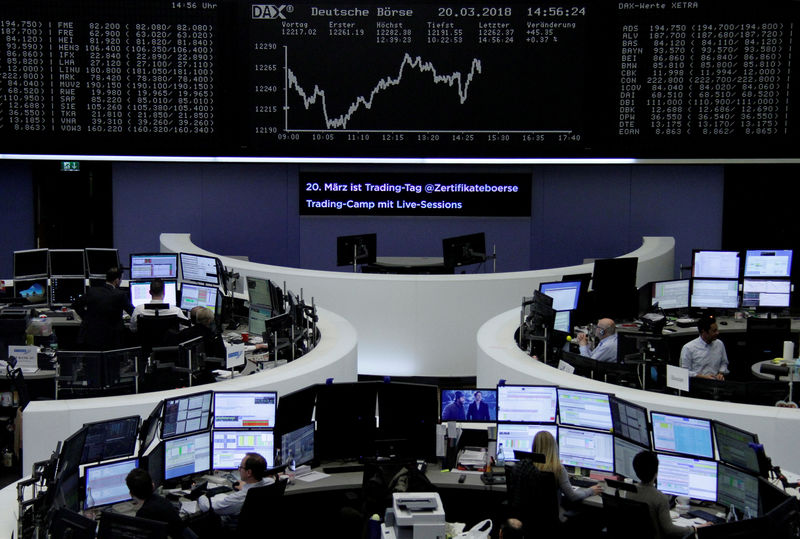By Abhinav Ramnarayan
LONDON (Reuters) - Investors shed safe-haven assets such as gold and government bonds while oil prices plummeted on Monday on expectations that the weekend's missile attacks on Syria would not mark the start of greater Western involvement in the conflict there.
European shares were broadly flat, however, adding to a mixed picture in Asian stock markets and suggesting that a degree of caution still prevails.
"There is some relief that a direct confrontation between the U.S. and Russia over Syria has been avoided," said DZ Bank rate strategist Daniel Lenz, after Russian President Vladimir Putin warned on Sunday that further Western attacks in Syria would bring chaos to world affairs.
Saturday's strikes marked the biggest intervention by Western countries against Syrian President Bashar al-Assad and his ally Russia, which is facing further economic sanctions over its role in the conflict there.
The United States, Britain and France said the missile strikes targeted Syria's chemical weapons capabilities and were not aimed at toppling Assad or intervening in the civil war. U.S. President Donald Trump tweeted "Mission accomplished" after the attack, underlining expectations that Western action would be limited.
Gold prices
Yield on both German and U.S. 10-year government bonds, seen as among the most liquid and safe assets in the world, were both at their highest level in three weeks. (DE10YT=RR)
Oil prices meanwhile dropped sharply, with Brent crude (LCOc1) shedding over 1.5 percent to $71.45 a barrel, though a rise in U.S. drilling for new production also dragged on prices.
MSCI's world equity index (MIWD00000PUS), which tracks shares in 47 countries, was flat on the day and a pan-European stock index (STOXX) was marginally lower.
U.S. stock futures were pointing to a higher opening on Wall Street. (ESc1)
That market is now focused on U.S. first quarter earnings, especially after February's sell-off and tech sector woes took valuations down to more reasonable levels, said Salman Ahmed, chief investment strategist at Lombard Odier Investment Managers.
"If there is a genuine dent in earnings, people will sit up and take notice -- stock and sector-specific issues are becoming important," he said.
He added that regulation will also be a powerful driver for the tech sector -- citing the example of Facebook (NASDAQ:FB) -- and for the banking sector.
EYEING ABE
The dollar failed to hold its early gains on the yen and eased to 107.20
Dealers were keeping a wary eye on Japanese politics after a survey showed support for Prime Minister Shinzo Abe had fallen to 26.7 percent, the lowest since he took office in late 2012.
Abe's sliding ratings are raising doubts about whether he can win a third three-year term as ruling Liberal Democratic Party (LDP) leader in a September vote, or if he might even resign before the party election.
Japan's Nikkei (N225) rose 0.3 percent while MSCI's broadest index of Asia-Pacific shares outside Japan (MIAPJ0000PUS) slipped 0.4 percent as Chinese blue chips (CSI300) skidded 1.7 percent.
The euro was a touch higher at $1.2357 (EUR=), while the dollar index eased to 89.621 (DXY).

For Reuters Live Markets blog on European and UK stock markets open a news window on Reuters Eikon by pressing F9 and type in 'Live Markets' in the search bar